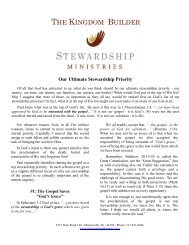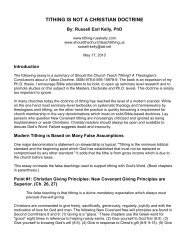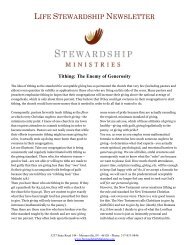âWill a Man Rob God?â (Malachi 3:8) - Biblical Foundations
âWill a Man Rob God?â (Malachi 3:8) - Biblical Foundations
âWill a Man Rob God?â (Malachi 3:8) - Biblical Foundations
You also want an ePaper? Increase the reach of your titles
YUMPU automatically turns print PDFs into web optimized ePapers that Google loves.
2<br />
TITHING IN THE OLD TESTAMENT<br />
For convenience’s sake, we will divide the Old Testament’s discussion on tithing into three<br />
sections: tithing prior to the Mosaic Law; its description in the Mosaic Law; and the few texts<br />
that mention tithing after the giving of the Mosaic Law. At the very outset, it should be noted<br />
that a comprehensive discussion of the tithe in the Mosaic Law would be incomplete without<br />
placing this practice in the context of Israelite worship of Yahweh. While tithing was a part of<br />
Israelite worship at large, 3 we will limit our discussion to the passages that explicitly refer to<br />
tithing, recognizing the overall context in which tithing took place.<br />
Tithing Prior to the Mosaic Law<br />
Three sets of text have been adduced to garner support for the applicability of tithing in the new<br />
covenant era, surrounding the practices of Abel, Abraham, and Jacob. The questions that present<br />
themselves are as follows. First, do these texts demonstrate the “practice” of tithing before the<br />
giving of Law? Second, would the presence or practice of tithing prior to the giving of the Law<br />
necessitate that the practice continue? Finally, is there anything parallel to tithing that was<br />
practiced prior to the giving of the Law and that was incorporated into the Law which may serve<br />
as a point of comparison? Our contention in the present section is this: The texts that discuss<br />
tithing prior to the Mosaic Law do not portray tithing as a systematic, continual practice but as<br />
an occasional, even exceptional, form of giving.<br />
Abel. Why did <strong>God</strong> accept Abel’s sacrifice but not Cain’s? That question has been<br />
answered in a number of different ways: 4 (1) Abel sacrificed an animal rather than bringing a<br />
different kind of offering; 5 (2) the quality of the sacrifice was inferior; 6 (3) Cain’s sacrifice was<br />
unacceptable owing to a deficiency in his character; 7 (4) Cain was not the object of <strong>God</strong>’s<br />
sovereign election; 8 and (5) Abel’s offering was a tithe. The New Testament adds the insight that<br />
3 See, for example, Exod 25:1–2; 35:4–10, 21–22; 36:5–7; Num 18:12; Deut 16:17; 1 Chron 29:9; 16; Prov 3:9–10;<br />
11:24–25; 22:8.<br />
4 For a discussion of possible interpretations, see Richard S. Hess, “Abel,” in Anchor Bible Dictionary (ed. David<br />
Noel Freedman; New York: Doubleday, 1992), 1.9–10.<br />
5 See <strong>Rob</strong>ert S. Candlish, An Exposition of Genesis (Wilmington: Sovereign Grace, 1972), 65. Note also that Scofield<br />
views it this way (The Scofield Reference Bible [New York: Oxford, 1909], 11).<br />
6 See Hermann Gunkel, Genesis (Macon: Mercer, 1997), 42–43.<br />
7 See Bruce K. Waltke, “Cain and His Offering,” WTJ 48 (1986): 370; Umberto Cassuto, A Commentary on the Book<br />
of Genesis (Jerusalem: Magnes, 1961), 1.205; Kenneth A. Matthews, Genesis 1–11:26 (NAC; Nashville: Broadman<br />
& Holman, 1996), 267–68; John J. Davis, Paradise to Prison: Studies in Genesis (Grand Rapids: Baker, 1975), 99.<br />
See the comments on a priest’s character when offering a sacrifice in Lev 8–9, 26; see also Num 16:15, 1 Sam<br />
26:19, and Isa 1:13. Note also that Augustine, Calvin, and Luther held a similar view; see Jack P. Lewis, “The<br />
Offering of Abel (Gen 4:4): A History of Interpretation,” JETS 37 (1994): 489, 493.<br />
8 See Gerhard von Rad, Genesis: A Commentary (Philadelphia: Westminster, 1974), 104.








